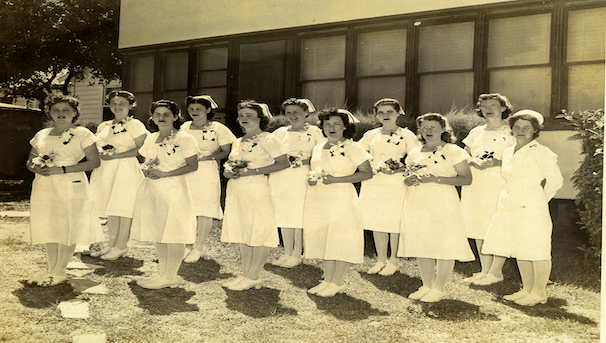This project is now in update mode. Check back regularly to see how things are progressing.
Help Make History Come Alive
About this Fundraising Campaign:
The mission of Voces Oral History Project within the Moody College of Communication is to capture, preserve, showcase, and disseminate the stories of U.S. Latinos and Latinas who served their country during WWII and the Korean and Vietnam war periods.
But without a modern, functioning website, thousands of remarkable stories and beautifully recorded video interviews are obscured. A website redesign will cost $40,000, and we have received a $20,000 matching gift commitment from Guillermo Nicolas, a generous supporter of Voces. Will you help us raise $20,000 by making a gift today and sharing this project with your friends and family?
We believe that stories are powerful ways to make sense of our past -- and our present. These stories, with men and women who have often been left out of historical accounts, are crucial to telling the American Story. For 17 years, students from The University of Texas have interviewed and written stories for all of our subjects.
All gifts received above our fundraising goal will help Voces with other critical funding needs to advance our mission.
One of the Stories Captured through Voces:
Conditions were bleak on Bataan Peninsula in the Philippines, where the Americans had retreated in January 1941. They had no supplies and had to rob their own Army trucks to get food, said Abel Ortega, an Austin native.
"We ate all of the horses of the cavalry . . . all of the water buffalo . . . all of the monkeys, and all the snakes, and everything else that moved in order to stay alive," he said. "It was
a horrible ordeal."
The Americans also lacked medical supplies and soon the U.S. soldiers began to succumb to malaria, dysentery and other tropical diseases, as well as to combat fatigue.
Despite the monumental difficulties, the American troops -- and their Filipino allies -- on Bataan were able to fight off the Japanese landings until April of 1942. Finally, it became clear that an American surrender was inevitable; the soldiers were ordered to destroy their equipment so it would not fall into enemy hands.
"We were overwhelmed," he said. "There were just too many . . . Japanese."
The 22-year-old Ortega knelt down next to his half-track and prayed, "Oh God. I don't want to die."
About Voces Oral History Project:
Voces Oral History Project is a research unit housed within The University of Texas at Austin Moody College of Communication, School of Journalism, in collaboration with the UT Libraries. It was established in 1999 by Journalism professor Maggie Rivas-Rodriguez. The project initially focused solely on the WWII generation and then expanded its collections to include Latinos and Latinas of the Korean War and Vietnam War generations. Most recently, it added those involved in Political and Civic Engagement.
Getting More Involved:
If you are interested in joining the Voces Oral History Advisory Council or want to learn more about leadership level giving opportunities for the Voces Oral History Endowment, please contact Maggie Rivas-Rodriguez at mrivas@austin.utexas.edu or (512) 471-1924.
$26
WWII GIs average age
During World War II, the average age of the U.S. serviceman was 26. A few men falsified their birth certificates to join the military as young as 16 years of age. But there were many older men who served.
$60
WWII 60th anniversary
In 2004, Voces took part in a commemoration of the WWII Memorial and a World War II Reunion in Washington, D.C., on the Main Mall. Voces' contribution: making sure Latinos were added to four panel discussions and distributing project newspapers about our interviewees.
$100
Global Impact
World War II affected more than 100 million people across the globe.
$200
200th Coast Guard Artillery
This New Mexico unit 200th Coast Artillery and the 515th Coast Artillery were charged with defending the Philippines against the Japanese during WWII. Many became POWs and would be part of the famed Bataan Death March.
$500
The cost of an Interview
The interview costs around $500 to produce: travel, set up, interviewing; scanning photos, writing and editing a story from the interview, fact-checking. No quick way to do it. But our interviews deserve our best effort. A bargain at $500.
$1,000
Mil Voces
Mil Voces! Our 1000th interview. An exciting milestone for the Voces Oral History Project that will be officially celebrated in fall 2017.
$1,999
1999: Voces is born
$1999 - The Voces Oral History Project was started in 1999 by Dr. Maggie Rivas-Rodriguez, originally called the U.S. Latino & Latina WWII Oral History Project. Now, 18 years, four collections, and nearly 1000 interviews later, the project continues to fulfill its mission of weaving the Latino story into the tapestry of American history.
$5,000
Number of photographs scanned
Voces has a treasure trove of high-resolution photographs that are part of each interview file. These are favorites of documentarians, journalists and others. A new website will help display the photos.
$10,000
SPARs
Between 1942 and 1945, more than 10,000 women enlisted in the newly created United States Coast Guard Women's Reserve, known as the SPARs after the Coast Guard's motto "Semper Paratus, Always Ready.



